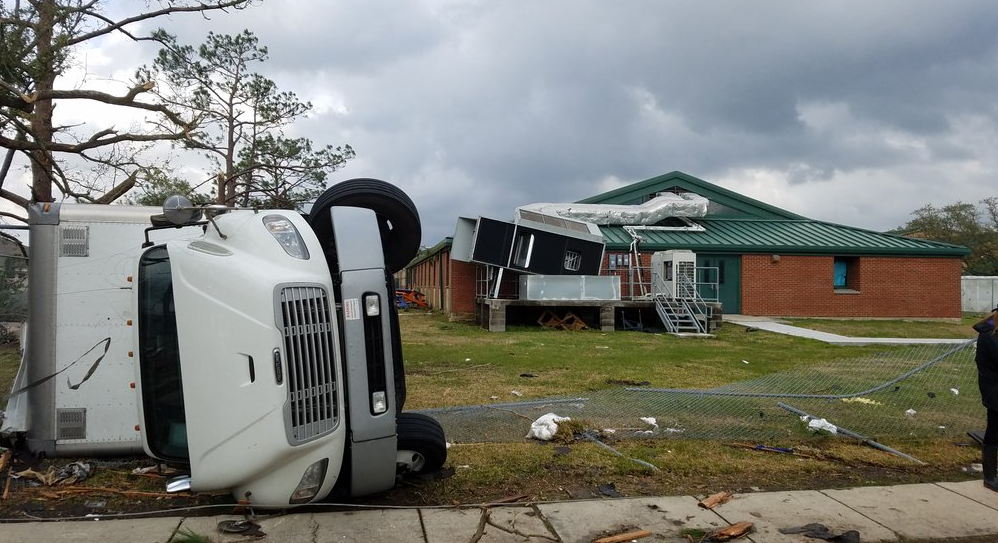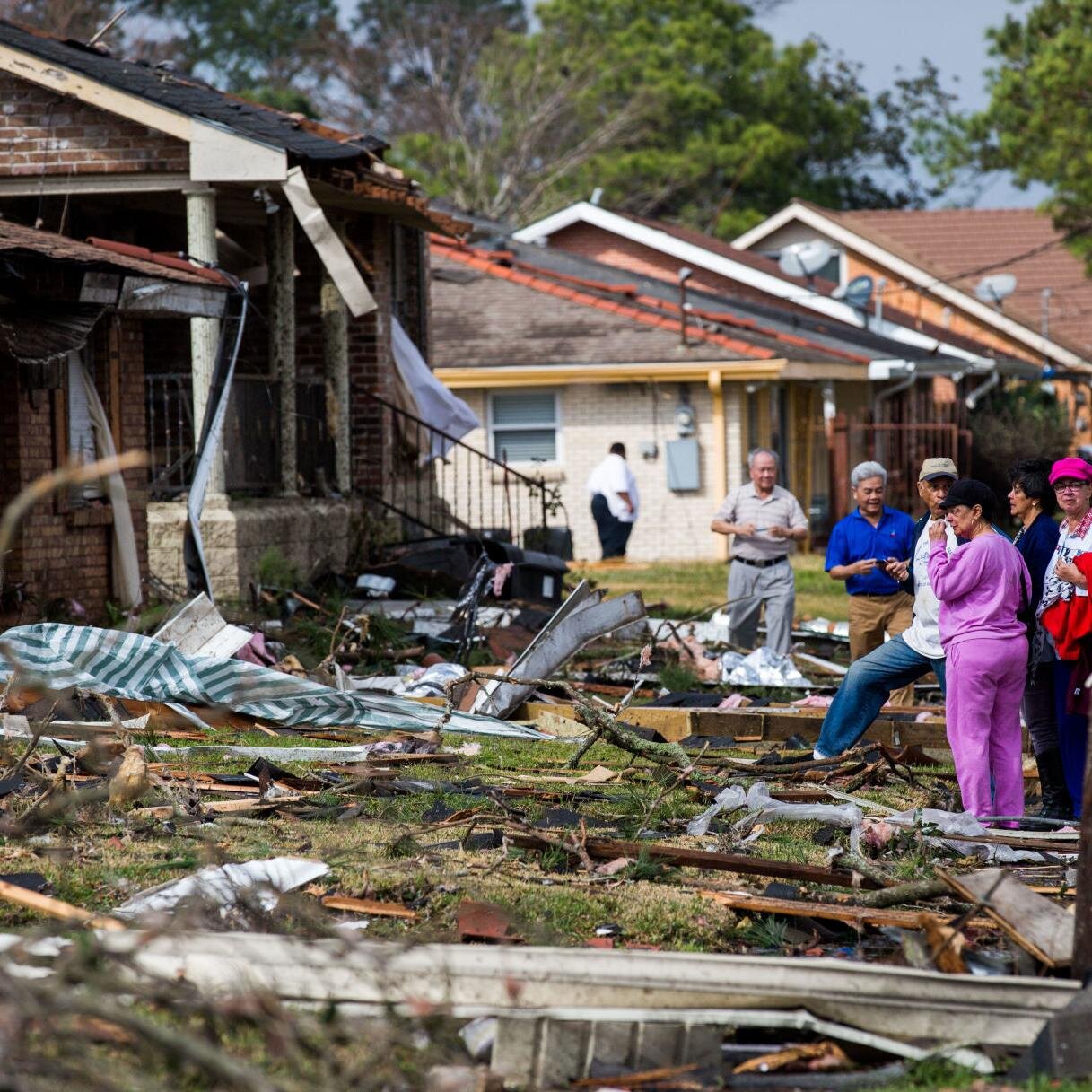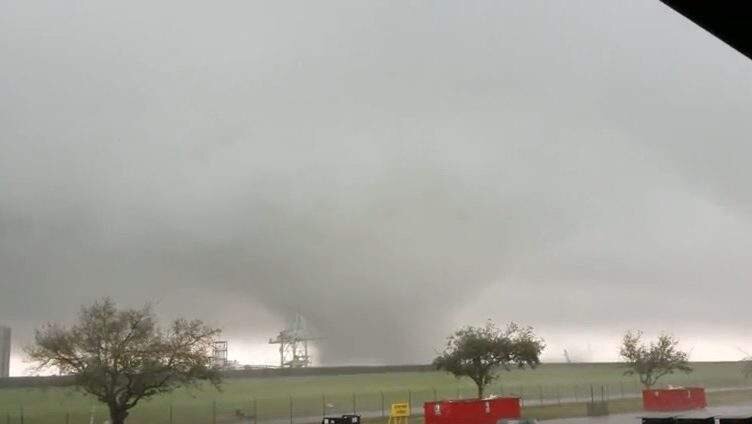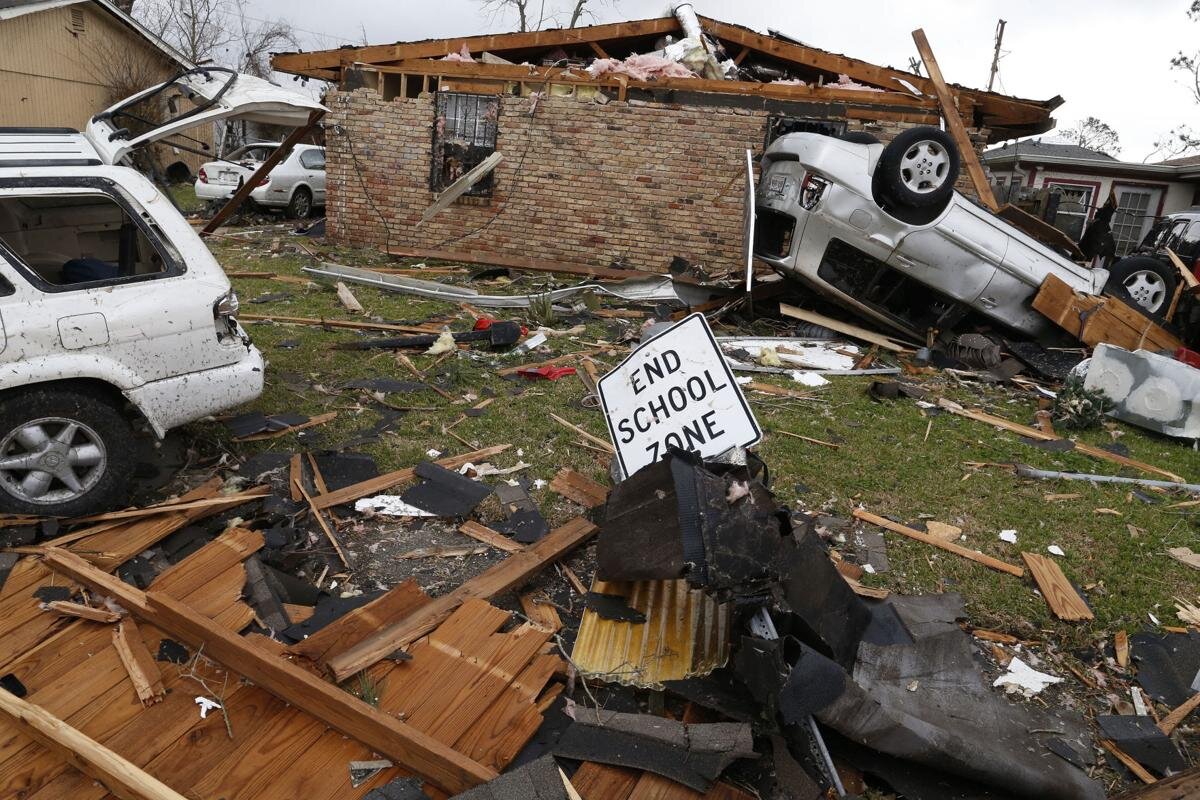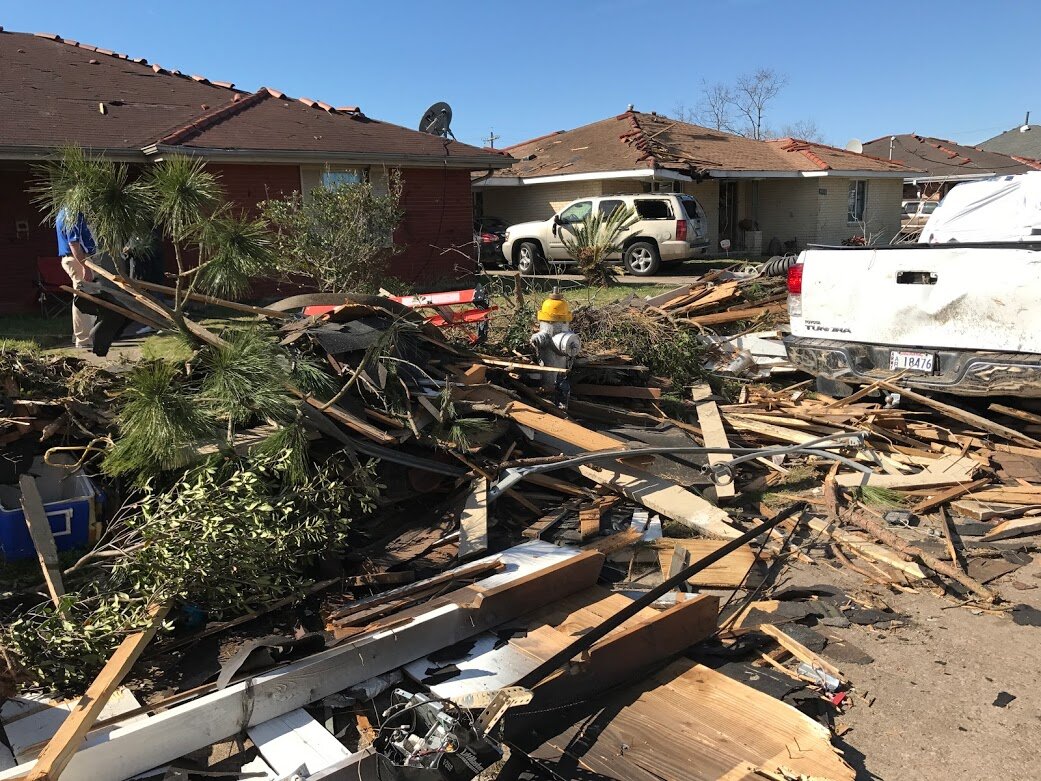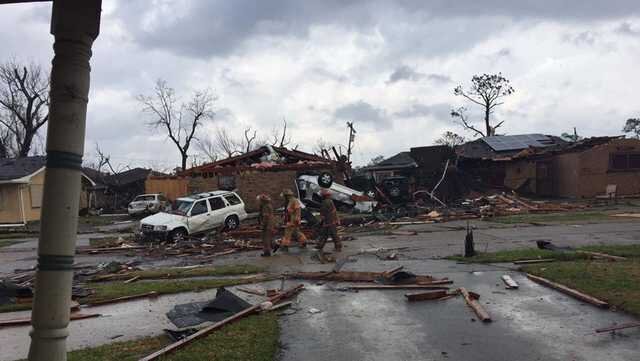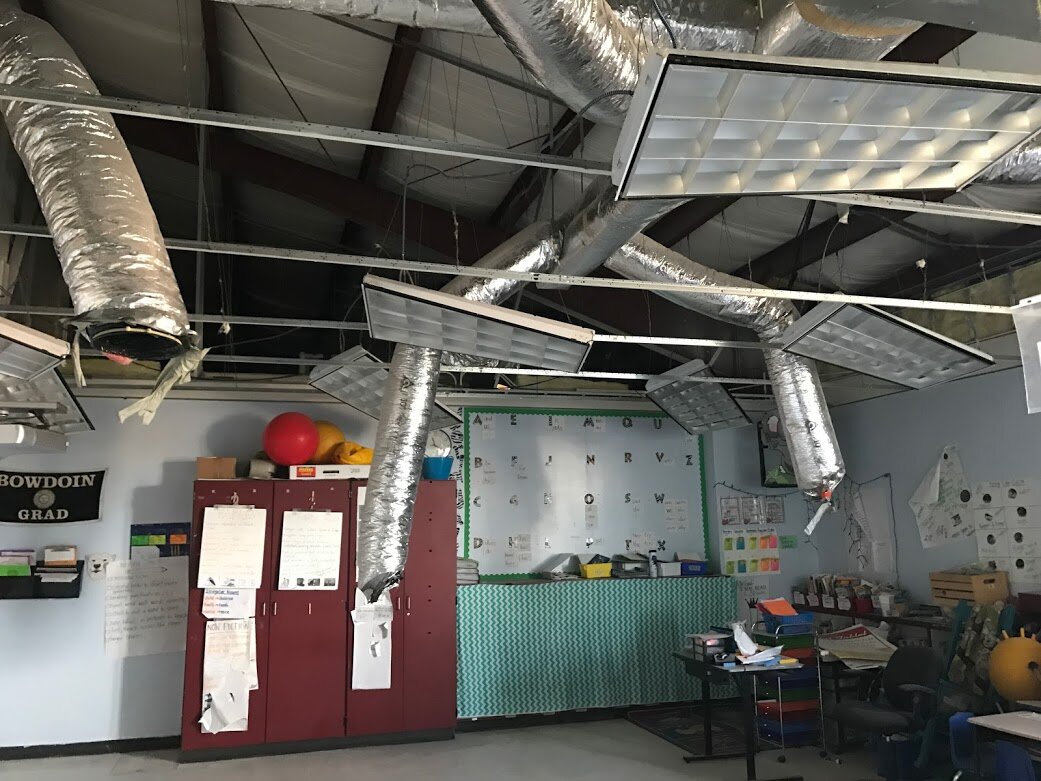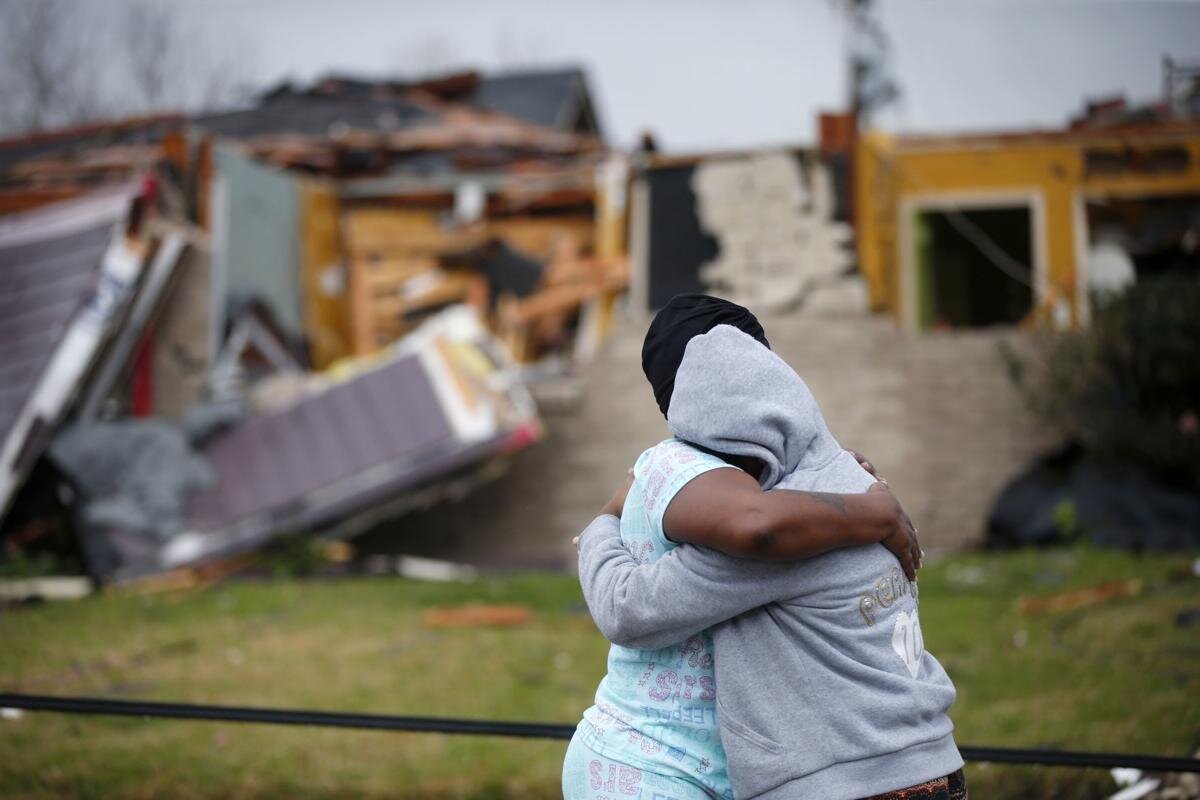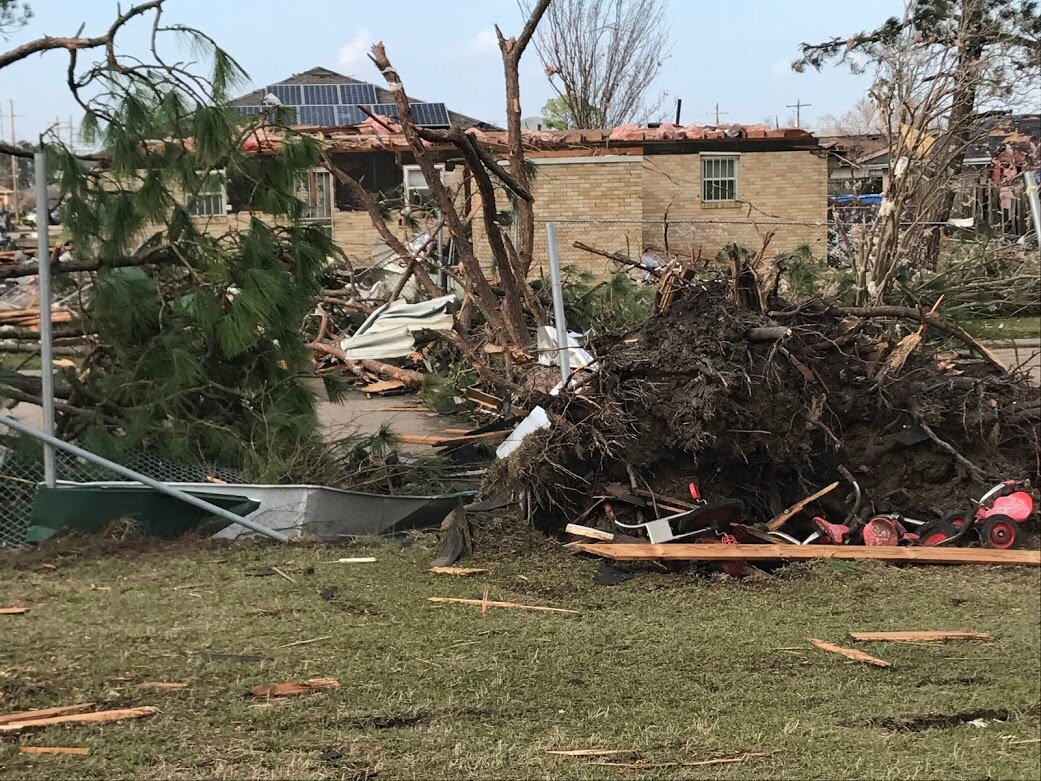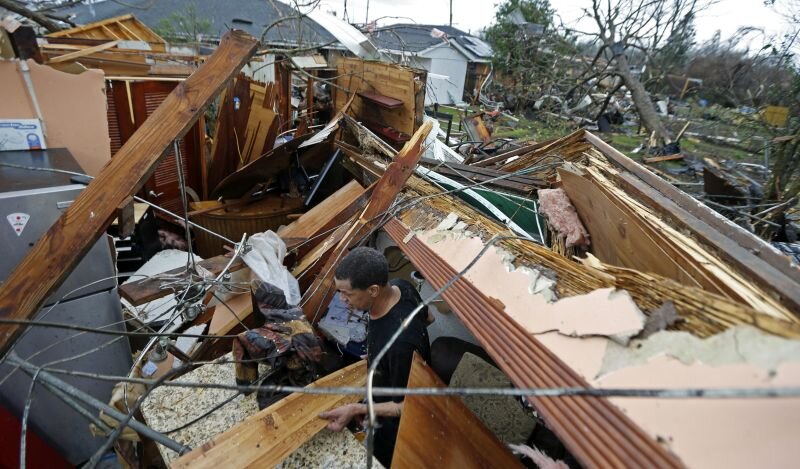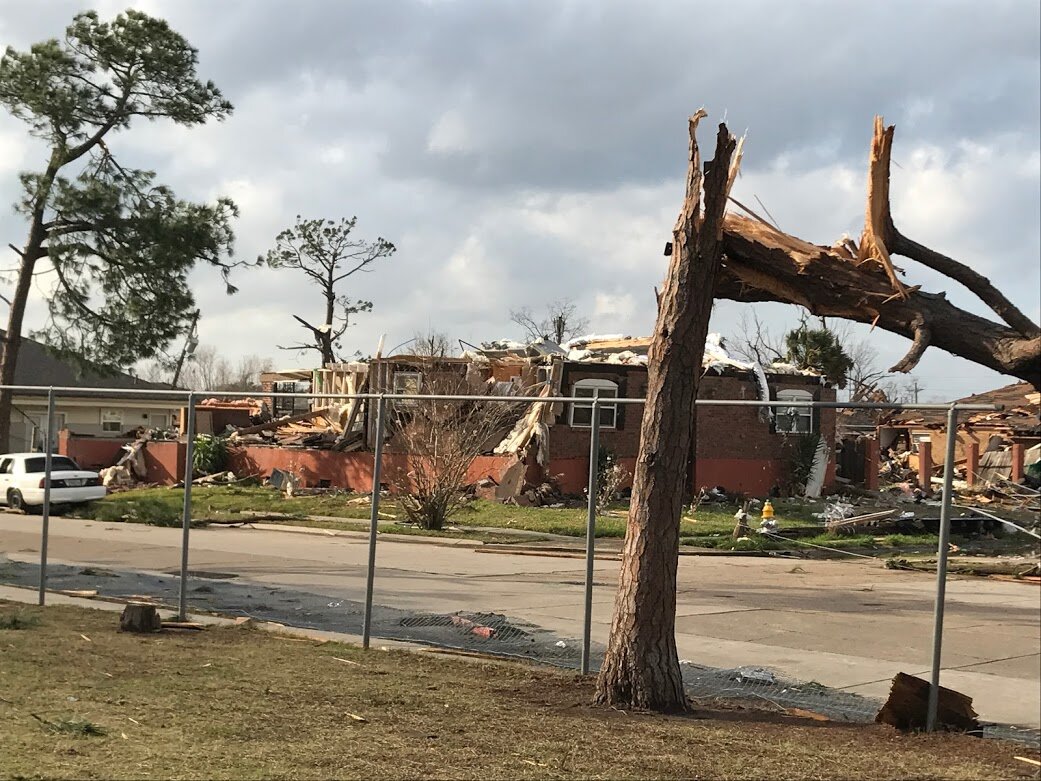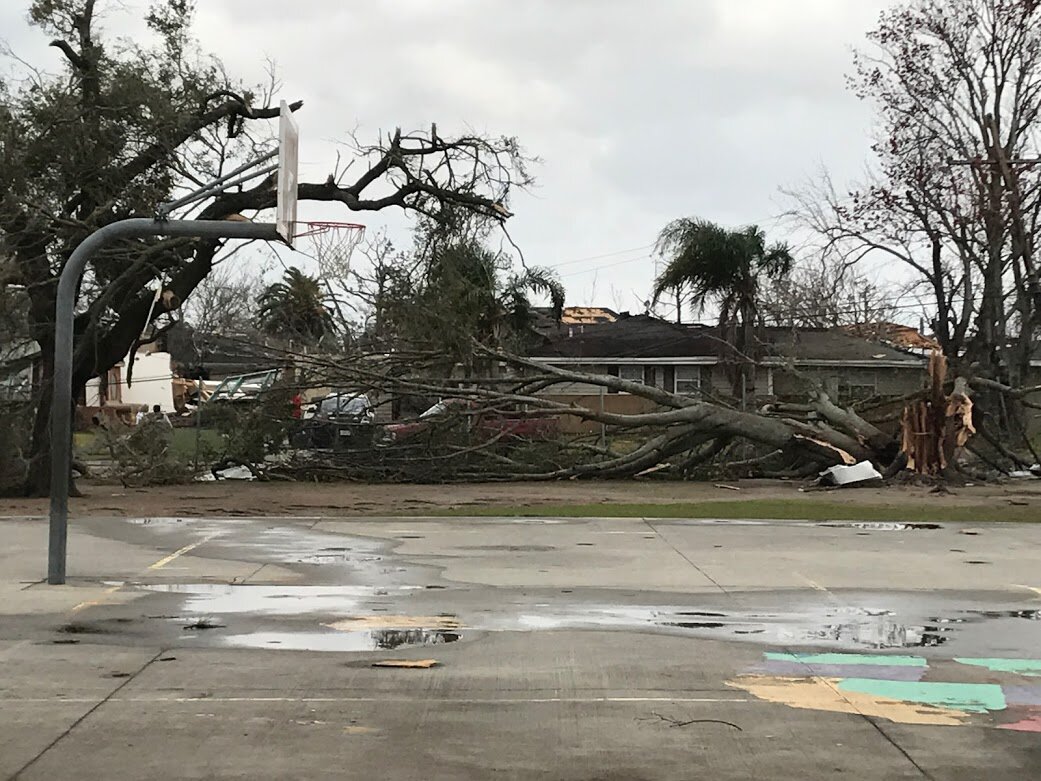Wait, Weren't You Guys Teachers?

Anybody recognize these two? No? Us either.
That’s us back in the day, when we were teachers, outside of our first apartment together in New Orleans. We’ve been getting this question - “Hold up, weren’t you guys teachers?” - a lot recently, so, for today, we figured we’d address it here for all to see. How long did we teach for? Where? What kind of teaching did we do? Why aren’t we teaching anymore? Will we ever teach again? This post will answer all these questions and give you a little insight into our lives before the island.
Before we dive in, I’d like to just say that even though Kevin and I made this decision together, we each did it for our own personal reasons. I’ll give the brief description of Kevin’s choice, but please know that there is more to it, of course, that he can share from his own perspective. I’ll focus largely on my own experience during my years as a teacher and my decision to call it quits.
So, to start: How long did we teach for? Where? What kind of teaching did we do?
The answer to this is different for each of us. In total, Kevin taught in a classroom setting for six years - two years in Palm Springs, three years in New Orleans, and one year on St John, all in a private school setting. I taught for two years in New Orleans in a public charter school, and one year in a St John private school - three years total. In addition, together, we taught homeschool for (nearly) one year here on St John. (“Nearly” because our time was cut short due to covid.)
We were both humanities-oriented teachers - Kevin focusing more heavily in History, while I focused more heavily in English, though we each taught courses in both. Kevin taught everything from 6th Grade to 12th Grade, including AP history courses. I taught everything from 4th Grade to 9th Grade, including special education.
What I’ll focus on next, and for the bulk of this piece, will be my first two years teaching - the most challenging years of my life to date.
Anyone who’s taught before will tell you, there is nothing quite like your first year in the classroom. It’s one of the only professions, I would argue, in which you must appear to be a pro, to know exactly what you’re doing, from day one. You’re thrust into a space in front of, in my case, 36 children (the maximum number of students allowed in one classroom in the state of Louisiana), each of whom is looking to you for guidance, direction, leadership, many of whom are looking for ways to test you, searching for your weak spots, and you have little to no training in the actual act of being alone in front of kids. Sure, you may have sat in on classes, watching a veteran teacher effortlessly do the dance, all eyes on them, a side-eyed “teacher glare” correcting the slightest behavior mishap. They know the material inside and out, and can call upon even the most inattentive, or the most despondent student to engage.
You think, How hard could it be, right? Wrong.
My first year teaching was the single most challenging year of my life, but it taught me so much about myself, and I am a hell of a lot tougher (and more cynical) from it. In fact, that first year, for me, was nothing short of metamorphic. I walked into that classroom in New Orleans East on the first day of the school year, a starry-eyed, naive recent college graduate - also a skinny little white girl from Connecticut - and, months later, I walked out of there a pragmatic, tenacious educator, with a commanding presence and a determination to succeed.
I carried that energy with me into Year Two, and, honestly, I was amazed by my own transformation when I stepped into the classroom in front of 36 brand new faces.
But enough blabbering and self-promotion (honestly, I wouldn’t say that kind of stuff about myself if it weren’t true though - this is one thing I’m proud of and have got to give myself credit for). What I’d prefer to do is to just show you how trying some of these experiences were, by sharing with you some bits of writing I did as I was going through the teaching process itself.
What follows is a series of journal-entry style writing I did to help myself cope with, understand, remember, and grow from the experiences I had in the classroom during that first (and second) year.
I’ve written it in a very stream-of-consciousness way (as one does with a journal). My hope is that these snippets will help bring to life my experience of teaching in New Orleans East, and why, ultimately, I decided that my yearning to be a teacher had been fulfilled, my passion exhausted.
*Please note, I’ve left out the names of the schools and changed students’ names to protect their privacy.
New Orleans East, Louisiana
Michael
September, 2016
“Shut the fuck up, you stupid white bitch. You can’t tell me nothin’.”
Instinctively, I jump to my left and crouch to the floor. I throw my hands over my head to protect my neck as Michael hurls a desk at my body. It knocks my side, and Michael storms out of the room. Some kids laugh, others stare blankly. A few shocked, frozen faces search my body with their eyes, afraid of what they might see. I stand up, shaken by what has just happened, but otherwise unharmed, save for the bruise that I feel slowly forming on my left hip.
My right hand is trembling. “Please continue reading Chapter 2 silently and independently,” I say. I hear the tremor in my own words, embarrassed that my students can sense my fear. I rack my brain, desperately trying to make sense of Michael’s outburst. I had asked him to sit down, the way I do with any of my students who move around when sitting down is the expectation.
I send a message for help, and to let the administration know that Michael is wandering around the building. A few minutes later, a culture team member marches him right back in, stating that if he gives me any more trouble, she’s going to call his mama. “I don’t care!” he yells as she walks away.
Later that day, the school counselor tells me she has visited Michael’s home. His family - Michael, along with his mother, two sisters, brother, and cousin - are all living in the same one-bedroom apartment. There is no furniture, save a queen-sized, two-inch foam mattress cover and a blanket on the floor. Mom says that last night was Michael’s shift sleeping on the concrete. He didn’t sleep much, and was cranky when he left for school this morning. She asks that we please give him an appropriate consequence for his actions, and she will address him accordingly when he gets home as well, but could we please not suspend him. She is working three shifts today so that she can buy him a new pair of socks - he has worn through his old pair, and other students have been picking on him for his smelly feet. She cannot afford to take time off work to stay home with Michael.
In case you thought I was kidding.
As a product of independent schooling, a stable household, and global travel - in essence, privilege - I entered Teach for America with the idea, as most of us do, that I would walk into my classroom in New Orleans East, and with confidence and passion I would transform my students’ lives, on both an academic and a personal level. I quickly discovered the naiveté of my quest, and spent the months that followed desperately trying to manage a classroom of 36 students, each with unique needs, many with extreme exceptionalities and social/emotional traumas.
Throughout my first year, there were many more instances like the one I describe above. In addition to frequent fistfights, on a few occasions, there were knives, razor blades, and gas lighters involved. As Michael's story showcases, exhibited behaviors are often the result of a child's circumstance or an indication that something else is going on in that child's life that we, as educators, may not be aware of. I tried to constantly remind myself of this, even in some of the most trying moments.
I have so many notes saved from the kids. Tiny little messages like these got me through some tough moments as an educator.
If all the traumatic incidents my students had already witnessed weren't enough, midway through Year One, our school was hit by an EF3 tornado - the most powerful tornado in New Orleans' recorded history.
It happened during the school day, just after first period.
It was stormy that morning. Rain was pummeling against the single glass pane that filled the only window in the classroom - our sole source of natural light. I was guiding a whole group read aloud when the sky darkened and I was interrupted by the loudest crack of thunder I've ever heard. In the momentary silence that followed the thunder's clamor, we heard the unmistakable sound of shattering glass, and I knew we were in trouble. I remember feeling the building shake, the space filling with shrieks of terror, small bodies darting under desks and behind shelves.
We didn't have a tornado drill in our manual, so had never practiced, and I didn't grow up in a region that required tornado drills, so I couldn't draw upon knowledge from my childhood either. Intuition told me to get the students into the hallway, away from that tiny window. I rallied up all 36 students and instructed them to get as low to the ground as possible. The hallway quickly filled up - nearly 1,000 students and hundreds more faculty and staff members packed into one long stretch of windowless corridor.
Another loud crack, and the lights flickered into absolute darkness. The only glimpse of light we would see for hours came from a flash of lightning that ripped through the building as the door at our end of the hallway swung open, fractured at its hinges. Debris flew in through the opening. Children wept as we barricaded the door, fearful for their own lives and, at this moment, fearful for their teachers'.
The sounds of shrill screams, roaring thunder, shattering glass, splintering tree trunks, crumbling cinder blocks, and whipping sheet metal produced a sonance that rang in my ears for days. I can still imagine it, and it gives me goosebumps.
My students were “Katrina Babies,” meaning they were born either immediately before, during, or in the months of displacement and disaster that followed Hurricane Katrina in August 2005. As I desperately tried to comfort crying children, calm panic attacks, ease anxiety, keep my students alive, a student named Michelle squeezed my hand and said, “Ms. Clements, this is our Katrina.”
Once the tornado passed, we remained in the hallway, which was littered with puddles of sweat, vomit, tears, and urine, for another four hours, afraid there might be another tornado heading our way. Students prayed, sang, cried, and slept, overcome with intense exhaustion. I shuffled kids in and out of my classroom to pee in the trash can while I rummaged through closets, overturned desks, abandoned book bags, and jack pockets, scrounging for anything students could eat and activities to keep them occupied.
Luckily, I found some old Poptarts left over from breakfast a few weeks prior, a bag of uncooked ramen noodles, a pack of gummy bears, and a deck of UNO cards. We sat in that smelly hallway and played UNO until it was safe enough to go home. After that day, I always made sure to keep a deck of UNO cards in my classroom - I have so much gratitude for the simplistic calmness that game elicited for my student after the tornado. I used this tactic on two other occasions, when there were active shooters on campus and we were in Code Red lock-down. In those moments, I realized the gravity of my privileged responsibility as a teacher.
Tuesday, February 7th, 2017 - the day the tornado ripped through the New Orleans East community - left me with a powerful reminder: there is so much in the world that we cannot control; however, especially in moments like these, kindness and love are the most powerful forces. From that moment on, I carried this sentiment with me everyday as an educator.
In the days that followed, we relocated to a new facility two miles down the road. The damage the tornado had caused was severe, but concentrated - only the structures within a one mile radius of the school had suffered significant damage (which, in a weird way, made it feel personal). In one week, we banded together and flipped an old, rundown facility, whose walls were still stained with watermarks from Hurricane Katrina, into a functioning school.
The tornado had changed many things in our lives. One of these was my relationships with my students. We had been through something significant together, which bonded us and gave us a different understanding of each other, despite our perceived (and real) differences.
Though the tornado did provoke a spike in extreme behavioral outbursts (as any traumatic event like this would), through persistence, self-reflection, and relationship-building I became skilled at de-escalating students when they reached these extreme levels of rage and frustration. I learned techniques to approach a child in a non-threatening manner, what questions to ask, responses to give, and how to manage my own intense array of emotions in moments of heightened commotion. As I became more skilled, I noticed my students beginning to trust me more as an adult and as an ally.
Michelle
April, 2017
Thump. Thump. Thump. Thump.
I listen to the rhythmic pounding of forehead against concrete wall. Her hands are clenched in tight fists. Razor-sharp nails, decorated in purple marker, dig themselves into the life line creases of her palms. Her eyes, a beautiful shade of mahogany, outlined with lashes that give her eyes an exaggerated roundness, stare fixated, unblinking, at the white-coated cinder blocks as she rocks back and forth. Her full cheeks are coated in wetness, her jaw clenched firmly. She lets out one long shrill cry, a release of pent up emotion.
I am afraid. I look around me for help, but the only being I see between us and the flickering light at the end of the hallway is a juicy cockroach that scampers across the floor to a crack in the cement, where it burrows itself and disappears. I move closer to Michelle, slowly, every movement of my body deliberately calculated to minimize any sense of perceived threat.
“Don’t touch me,” she screams. I take a step back.
“I’m not going to hurt you, Michelle. I promise,” I say with hyperbolic gentleness. I sit down on the floor across the hallway from where she stands. “Come sit by me, please? We can talk, or not talk. Just, please, come sit down.”
I think she senses my desperation. The thumping stops, and, without lifting her feet, Michelle slides her body and sits down beside me. She hugs her knees and continues to rock back and forth. Rhythm seems to feel comforting.
Moments of silence pass. Finally, Michelle breaks our shared silence with a whisper so faint, I’m not sure if I’m imagining it. “I want my mom,” she says. Knowing that her mother is behind bars and will remain that way for years to come, I wrap my arms around her trembling body. She does not resist. As we sit together in the hallway, the trembling of her body slowly begins to ease. Her eyelids begin to fall. Her muscles go limp, and Michelle falls into a deep, peaceful sleep.
By the end of Year One, I was exhausted - physically, emotionally, mentally.
I was proud that I had made it to the end (I later discovered that coworkers had placed bets on when I would quit), but unsure of whether or not I would be able endure it a second time. I spent the summer with my family in Connecticut - a much needed and well deserved break from the school year’s intensity.
After a few weeks of relaxation and mental restoration, I decided that I would return to New Orleans East in August. After all that we had been through during that first year, I realized I could not quit on my kids or on myself, so I spent the remainder of my summer researching and strategizing successful classroom management techniques. I figured if I got the management aspect in order, focusing heavily on anticipation and prevention of behavioral outbursts, I could finally focus on pushing my students academically the way I so desperately wanted to.
A friend recommended two books: 1-2-3 Magic and Teaching with Love and Logic. These became the foundational pieces that guided my classroom ideology. In addition, I drew, revised, and re-drew maps of my classroom. I had a plan for everything - seating charts, how papers would be passed out and turned in, data tracking walls, “Shout-Out” walls, a “Culture Wall,” which included rules and expectations, a consequence ladder, a class theme, and social contracts, which we wrote together on the first day of school and each student signed. In addition, I ensured that I had a designated space called the “Cool-Down Corner,” where students could reflect upon their actions and learn to control their emotions, using guided self-reflection papers and other kinesthetic materials such as stress balls, slime, and kinetic sand to de-escalate themselves before an outburst.
I also saved money and sought out donations to buy enough books to fill a shelf in the back of the classroom, and even bought a carpet and pillows for a reading nook - something that was totally foreign to my students. I chose books with which my students could relate - ones that featured black and brown children and encouraged them to take pride in their identities and strive for greatness, regardless of life’s obstacles.
A few favorites were Barack Obama’s Of Thee I Sing: A Letter to My Daughters, Trombone Shorty’s autobiography, and Carole Boston Weatherford’s Freedom in Congo Square. (These are now among the collection of books that Kevin and I read to Finn each night.)
I actively decided that instead of using reading as a punishment, as was often the case at my school, in my classroom, reading would be a privilege, so I carved out a sacred moment each afternoon during which students could forget everything else that was happening in their lives, both at school and at home, and we all (myself included) allowed ourselves to get lost in the world of literature. This, I found, had the power to be transformative.
Reading The First Lady of Hope - a biography of Michelle Obama, written by my MOM!
Keith
October, 2017
Keith, who calls himself “Yung Prince,” bursts through my closed classroom door. It’s my planning period and I have to finish writing report card comments by the end of the day. Keith slams the door behind him and beats his fist into the table. He’s shaking and mumbling something incomprehensible.
I get up and briskly move toward him. “Keith,” I say, “What is going on?” He starts to ramble about how “he did me this” or “he was sayin’ that.”
“Take a deep breath,” I tell him, placing a hand on his shoulder. “I’m listening.”
“Darren kicked me,” he says. “Why would he do that?” I ask, knowing that Darren is known to cause trouble, but that Keith will also provoke his peers. “He be sayin’ that my daddy don’t love me and that’s why he gone. But that ain’t right ‘cause my daddy be in jail. He don’t know.”
“How did that make you feel?” I ask.
“I be mad!” he says. A pause and then, “I hit him.”
“Is he okay?” “Yeah, he be fine.” Keith bursts into tears. “I didn’t mean to hit him. I don’t wanna be like that. But I got so mad. I miss my daddy. I don’t wanna be like that.”
Keith buries his face into my neck. I feel tears and snot soaking through my shirt, but I let him cry.
“Look at me,” I say finally, taking his chin in between my thumb and forefinger and looking him directly in the eye. “You are a good person, Keith. You know how I know? Because I can tell how badly you feel about hitting Darren. You made a bad choice, but there is a big difference between making a bad choice and being a bad person. Use this as a learning experience. Next time, try to remember how you feel right now, and try to make a better choice.”
Keith wipes his cheeks. “Can I go find Darren and apologize?”
“Of course,” I say. “I’m proud of you.”
Keith grabs my copy of Trombone Shorty’s autobiography - his favorite book, which he always asks to read when he is feeling overwhelmed or anxious, and walks back outside. A few minutes later, I peer through my window and see Keith and Darren sitting in the shade of the live oak tree in the yard, laughing and reading about Trombone Shorty together.
The classroom culture I cultivated in Year Two is something that I am deeply proud of.
During my first year (think back to Michael), if someone had told me about all that I would have accomplished in Year Two, I don’t think that I would have believed them. Where students once lashed out in violent fits of rage, the space I created morphed into a haven for students to feel safe and valued as individuals. There are few things I’ve done in my life of which I am prouder.
It was through hard work and perseverance that I ultimately overcame some of the hurdles that my first two years in the classroom presented. For that, I thank my students. The manner in which they showed grit and determination, even when everything in life seemed to be working against them, is what inspired me to do what I did, day in and day out. My students' contagious resilience and my own tenacity kept me from ever giving up on myself or on them, even in my most challenging moments as a teacher. I like to think that both my former students and I are better for it.
I’d like to add a final anecdote and a note, written by a beloved student of mine, Luna.
Luna has been dealt a rough hand, and therefore rarely opens up to people. She is extremely reserved, flinches at the notion of human contact, lies incessantly, steals, and yet she and I developed a relationship founded upon notions of truth and mutual respect.
On the first day of school, Luna walked in, dragging her feet, anxious about beginning another year that, as far as she knew, would be more of the same. (Her Third Grade teacher was fired during the previous year for slapping her across the face.) Immediately, Luna approached me, her new homeroom teacher, looked me directly in the eyes, took her thumb and forefinger and spread my eyelids wide.
“Your eyes are so blue!” she said. Her own deep brown eyes were wide with infatuation. Then she squinted, pouted, and said, “Why can’t I have eyes like you?”
My favorite book being Toni Morrison’s The Bluest Eye, this moment was particularly poignant to me. I made it my mission to make Luna see and believe that her black is astoundingly beautiful.
During one of the final weeks that I taught in New Orleans East, I came across Luna rolling around on the floor in the hallway. She was unsupervised, and was having another one of her meltdowns - a common occurrence, but this one was particularly explosive. Though I don’t know what set her off, her arms and legs were thrashing. She was pulling out tufts of her own hair, and her arms were covered in bite marks - some were even bleeding. I rushed over to her, sat down on the dirty floor beside her, and let her body melt into my lap.
“Repeat after me,” I said, wiping tears from her cheeks. “I am smart and I am beautiful.”
“I am smart and I am beautiful,” she whispered in between desperate gulps for air. “I am smart and I am beautiful.”
A few hours later, as students began to pack up their belongings for dismissal, Luna handed me a note. I gave her a hug, wished her a good weekend, and told her I’d see her on Monday. I stuffed the folded-up note into my back pocket, and finished cleaning up for the weekend. When I got home, I pulled out her note and began to read:
I love you Momie slash
Ms. Clements. I love you with a
ll my heart. Your my l
ight. You help me see through
the darkness. And I love you s
o much. Love, Luna
So, after all that, why leave this school in New Orleans East?
To be honest, I lasted WAY longer than I ever thought I would - I didn’t think I’d make it through the first week, let alone the first year, AND a second year. I decided about mid-year during Year Two that I wouldn’t return the following year, and together Kevin and I began searching for teaching jobs in various island locations (we decided while visiting my grandparents in Hawaii that the island life was something we wanted to try - see F*ck It, Let’s Move to an Island (Part 1)).
Ironically, as the year came to a close, though I had secured a job teaching Middle and High School English and History at a school on St John, I began to question my decision to leave New Orleans East. As difficult as teaching there was, it was all I knew as a teacher, and although the worst moments were BAD, the best moments were equally monumental. I had begun to feel strangely and unpredictably at home in this foreign (often harsh) environment.
But, I was exhausted (emotionally, physically, psychologically) from the demands of those two years, and I was excited to embark on this new island adventure, so off we went.
I won’t share about my teaching experience on St. John just yet - I’ll save that for (perhaps) another day.
But I will say that there are few people I admire more in the world than teachers.
The level of selflessness (especially now with COVID) that teachers exude is immeasurable. No teacher is paid adequately, and the amount of work that goes into teaching is completely underestimated.
To those lifelong teachers, I salute you. It’s fucking hard.
I wouldn’t trade in those years teaching for anything, but I’ll be honest, I sure as hell am happy I’m not teaching right now. I miss the kids - their creativity, the energy that only youth can inspire. But I don’t miss the long hours, the power structures, the political aspect of it all.
Will we teach again? Maybe. But for now, I’m content spending my days (perhaps selfishly) channeling my love and my energy into my own child, building and creating our home and this life. What we’ve got right now, I wouldn’t trade it in for anything.
But we wouldn’t be here, today, if we hadn’t been teachers. We wouldn’t be the people we are, living the life we’re living, if we hadn’t been teachers first. I will always and forever be grateful. And I will always love and remember each and every one of my students. They impacted me more than they will ever know.





